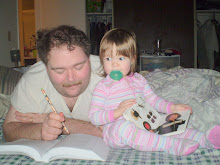In our church last week, we sang the carol O Holy Night. The first verse is the most commonly known, but the other verses speak to our faith in a much deeper way than most carols.
O Holy Night (thanks to Wikipedia)
O holy night! The stars are brightly shining,
It is the night of our dear Saviour's birth.
Long lay the world in sin and error pining,
'Til He appear'd and the soul felt its worth.
A thrill of hope the weary world rejoices,
For yonder breaks a new and glorious morn.
Fall on your knees! O, hear the angels' voices!
O night divine, O night when Christ was born;
O night divine, O night, O night Divine.
Led by the light of Faith serenely beaming,
With glowing hearts by His cradle we stand.
So led by light of a star sweetly gleaming,
Here come the wise men from Orient land.
The King of Kings lay thus in lowly manger;
In all our trials born to be our friend.
He knows our need, to our weakness is no stranger,
Behold your King! Before Him lowly bend!
Behold your King, Behold your King.
Truly He taught us to love one another;
His law is love and His gospel is peace.
Chains shall He break for the slave is our brother;
And in His name all oppression shall cease.
Sweet hymns of joy in grateful chorus raise we,
Let all within us praise His holy name.
Christ is the Lord! O praise His Name forever,
His power and glory evermore proclaim.
His power and glory evermore proclaim.
This hymn reminds us that Jesus came not only to free us from the power of sin and death, but from the chains of oppression and slavery. The Gnostic leanings of the modern church that isolate our spirits from our bodies are vigorously opposed in traditional carols and hymns. It is interesting to me that this carol affirms the mission that Jesus proclaimed for himself when he started his ministry.
"The Spirit of the Lord is on me,
because he has anointed me
to preach good news to the poor.
He has sent me to proclaim freedom for the prisoners
and recovery of sight for the blind,
to release the oppressed,
to proclaim the year of the Lord's favor." Luke 4:18-19
When Jesus declared this to be his mission, that mission was not only for him, but for those who wished to follow him. He also wasn't speaking spiritually, but was being very literal. The Gnostics were an early heretic group, and the divorce of spiritual from physical was their stock in trade, and what Paul and those who came after him were so angered by. The Gnostics saw the physical as evil and the spiritual as good. Fortunately for us, Jesus did not preach resurrection of the spirit, but resurrection of the body and restoration of creation. What this carol reminds us of is the fact that we are Jesus' partners in bringing that restoration about. We have an opportunity in this holiday season to live into the best traditions of our faith and spend time working on the restoration and reclamation efforts of the kingdom of God. Especially with the fears of an impending depression, we have the chance to carry the light of God into the culture we are in and break the chains of greed that force children to build toys in sweatshops, to release the oppressed and the oppressor both to live healthier lives characterized by concern for each other.
The line in the carol that says "the chains shall he break, for the slave is our brother" is a reminder of the question that Cain asked God "Am I my brother's keeper?" While I think that we know the answer to that question, the question of who our "brother" might be is given a deeper meaning. The slave….. but who is a slave anymore?
We think in terms of our history of slavery, but here in Portland a couple of months ago there was a huge human trafficking bust where many minors were freed. There are children and adults working in unsafe conditions for less than what it takes to survive, let alone thrive all over the third world. That unfortunately is the tip of the iceberg; we aren't even touching on what we call in the US wage slaves.
In our context, especially since I come from a long tradition of opposition to slavery in all its deceptive forms, how do I resist the oppression that I know exists? How do I seek freedom not only for the oppressed, but for the oppressor as well? These are the queries that I am holding in the light in this advent season.




